Philando Castile death: 'I lost my best friend in a police shooting'
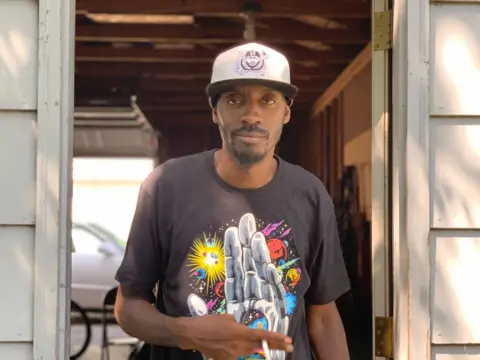 BBC
BBCAfter a police officer shot and killed Greg Crockett's best friend, he left Minnesota for good. Then in the aftermath of George Floyd's killing, he decided he couldn't stay away. How everything and nothing changed after the death of Philando Castile.
Greg Crockett was sitting in the passenger seat of his grandfather's van when he saw that - in the midst of rapidly escalating protests over the death of an unarmed black man named George Floyd at the hands of a Minneapolis police officer - an auto parts store near his old neighbourhood was on fire.
Although he moved away from Minnesota almost two years ago, Crockett told his grandfather he needed to go. In response, his grandfather, a retired Marine, quoted Che Guevara.
"The revolution is not an apple that falls when it is ripe. You have to make it fall."
As Crockett's flight descended over the Minneapolis-St Paul International Airport, an older white woman peered out the window, wondering if she'd be able to see the fires from the plane.
That night, from nearly the moment his feet hit the pavement, Crockett - a thin, acerbic 37-year-old who works at the Phoenix international airport - witnessed a rolling carnival of chaos. For over two hours, until his phone died, he captured scene after scene of casual destruction, at turns horrifying and darkly comedic.
A boy who looked no older than 15 or 16 lobbed a Molotov cocktail into a grocery store, only to have the lit rag fall out and singe his legs.
A group of 30 people worked furiously to break open a drive-through ATM, until an older man sauntered up at a theatrically slow pace with an enormous sledgehammer over one shoulder.
A young woman wilted in the street. Her friends tried to carry her into a car that offered a ride to the hospital, but then drove off at the last second without them.
There was not a police officer in sight. The red and blue lights of squad cars glinted blocks away.
"It's a beautiful day in the neighbourhood," Crockett sang through his medical mask.
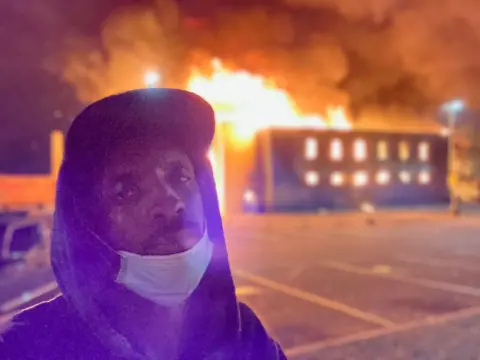 Courtesy Greg Crockett
Courtesy Greg CrockettHe ducked through a looted bank, a liquor store, a probation office, and a Mexican restaurant, where he found five masked men making themselves burritos, like college kids at the end of long night of partying.
He helped himself to some beers, knocked over a beverage dispenser that stained his jeans. Occasionally he took a swig from a fifth of Courvoisier that a looter handed him on the street.
"We out here, Minnesota. The revolution is starting right here," he said into the camera. "We shoulda did this four years ago when they killed Philando. We shoulda been out here."

In 2016, back when Crockett still lived in Minnesota, a police officer named Jeronimo Yanez shot and killed Crockett's best friend, Philando Castile.
When Crockett met Castile, he was a quiet, braces-wearing video game fanatic. The teeth braces came off but by all accounts little else about Castile changed. He became a well-regarded employee of St Paul Public School's food services division, known to students as "Mr Phil". To friends, he was "Chedda" because he always had a job and always made money.
Yanez pulled Castile over in a neighbourhood roughly 15 minutes away from the street where George Floyd would die in 2020. After Castile informed Yanez he had a firearm, for which he was properly licensed, Yanez seemingly panicked, firing into the car and hitting Castile seven times.
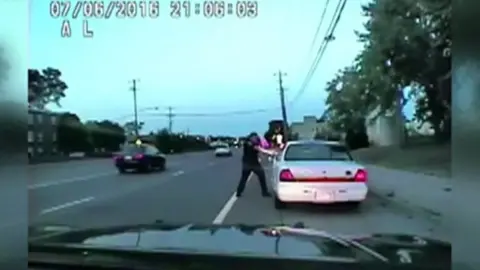 Reuters
ReutersCastile's girlfriend, Diamond Reynolds, turned on her Facebook Live seconds later, and captured her dying boyfriend's final moments while her four-year-old daughter watched from the backseat.
What happened next has become a routine in the US. The broadcast went viral. Castile's name became a hashtag. Protesters hit the streets all over the country.
Crockett and the rest of the pallbearers donned white suits that matched the one Castile wore inside his casket at a funeral that was carried on national television and attended by the governor of Minnesota.
Crockett remembers wanting to be angry, to be angry the way George Floyd protesters are angry now. But Castile's mother, whom Crockett calls his "auntie", told them to be peaceful. To let the criminal justice system do its work.
"She asked us to be cool," said Crockett. "We held it in. We held in our anger. We held in our emotions. We asked politely."
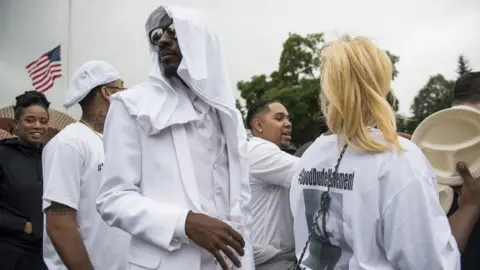 Getty Images
Getty ImagesManslaughter charges were brought against the officer, in which the prosecutor called Castile "compliant" and "respectful". But less than a year after the killing, a jury acquitted Yanez.
The day of the acquittal was at the forefront of Crockett's mind as he moved down Lake Street, past decapitated coin-operated parking metres and storefronts curtained with flames. If there had been an uprising in Minneapolis after #PhilandoCastile, would there have been a #GeorgeFloyd?
"RIP George - none of us knew you," Crockett said into the camera. "We shoulda did this four years ago. You shouldn't even be dead.
"They won't stop killing us. We want you to stop killing us."

Two days later, Crockett sat in a friend's backyard smoking a cigarette and drinking a beer. Brian McIntosh, the home's owner, wheeled an old, black office chair to the door of the garage and pointed at it. This is where Castile sat, he said, two weeks before he died. They'd played a game of chess.
"Minding his own business," McIntosh said.
Response to Crockett's Facebook Live was mixed. Some cheered him on. Some scolded him for being a part of a night that left an iconic corridor of South Minneapolis gutted by fire, water damage and looting.
Challenged about his behaviour, Crockett was unfazed.
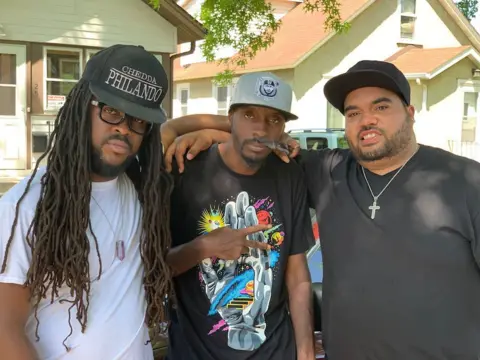
"A lot of people are really quiet folks. Everything that happens to them, they hold it in [until] they get drunk. That's when they let it out," he said. "This is the result. This is what y'all get. You can't keep pushing a person and thinking they're gonna keep letting you push them. No, one day they're going to push back. Now we pushing back. Now we're drunk."
A string of bad luck convinced Crockett to leave Minnesota two years ago. He got mugged at gunpoint. He got fired. He lost his apartment. His car got towed with all his belongings. Not long after that, he got on a flight to Arizona and vowed not to come back.
The Midwest, Crockett said, is not the same place that his great-grandfather moved to in 1947, in the second wave of the Great Migration. Their family left West Helena, Arkansas, to escape Jim Crow laws, to seek better jobs, a better education for their children, to achieve homeownership.
The same type of reasons that the Castile family came to Minnesota from Missouri. The same reasons George Floyd moved up from Houston, Texas.
But the Midwest changed.
The factories shut and the schools got more segregated and the quality of life gap between black and white Midwesterners got wider and wider. Crockett's parents fled Gary, Indiana, a troubled town that cratered when the steel industry left. They bounced around from Indiana to Wisconsin to Minnesota. He attended nine elementary schools and four middle schools before they settled in St Paul.
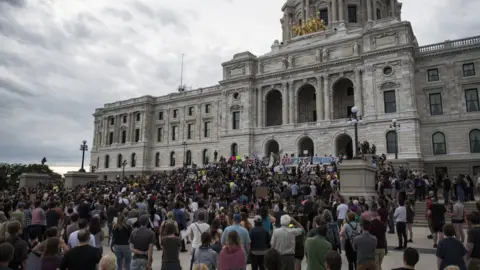 Getty Images
Getty ImagesCastile wasn't even the first person Crockett knew who was killed by police - his uncle Darryl Burns was killed by an Indianapolis police officer in 1992 at a traffic stop. Crockett was 10.
He has flashes of it in his memory. The phone call his mother took in the kitchen. A trip to Indianapolis to find out what happened. His uncle's Monte Carlo strafed with bullet holes.
At this point, Crockett's views have grown bleak. He no longer believes that a life sentence for his friend's killer would have prevented another death like George Floyd's. He's no longer sure he believes that peaceful integration is even possible. He feels that black people in America are essentially stateless.
"People talk about, 'We gonna fight back.' We can't fight back when we're on enemy land," he said.
Talking about it is overwhelming.
"I'm tired," he said, his eyes welling up. "I'm so [expletive] tired."
After Philando died, Crockett said all he did was work. He made good money but stopped paying his credit card bills. He coped by drinking. He moved through life as if in a metaphorical "blackout".
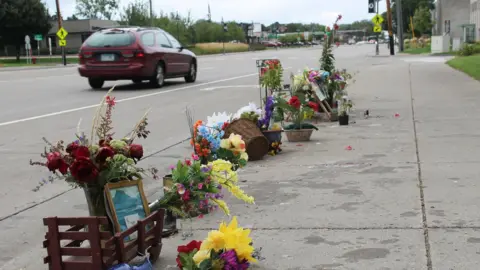
But now, for the first time in four years, at the intersection of Lake Street and Chicago with flames leaping from the buildings on all sides, Crockett felt something different. Something he knows others will find offensive.
"I feel great," he said. "I feel alive."
With his airport job on an indefinite hiatus due to the coronavirus pandemic, Crockett is buying up super-cheap plane tickets. From Minneapolis he flies to Nashville, Tennessee. From there he'll go to Atlanta, Georgia. Then it's on to Cleveland, Ohio, and the nation's capitol, Washington, DC.
"I'm gonna talk everywhere I go," he said. "I'm going to represent Philando everywhere I go."
He said he wants to see the revolution first-hand.
"All it takes is one little spark to light everything the [expletive] up and that's what happened. Minneapolis - this little bitty ass place," he said.
"It's so beautiful. It's so beautiful. It's absolutely beautiful."
